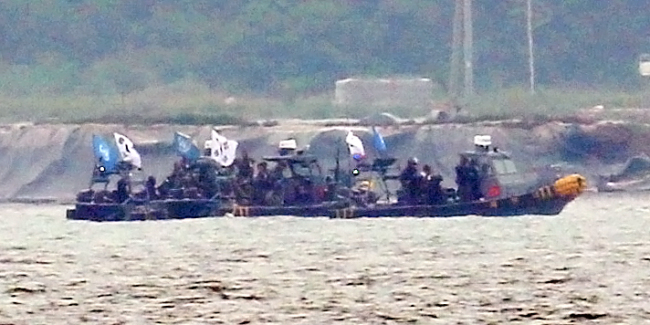North Korea on Monday lambasted the South’s joint crackdown with the U.N. Command on Chinese boats illegally fishing in neutral waters, threatening another provocation similar to the 2002 scuffle in the West Sea.
In its first reaction to the operation, Pyongyang’s state media condemned it as a “military provocation,” saying it will never accept such a “reckless maritime intrusion.”
Calling it a “vicious, evil plot,” the official Korean Central News Agency said that the campaign is aimed at escalating the intrusion from the hot spot of the West Sea to the Hangang River estuary by provoking the North’s defensive measure. It warned that “the attackers need to ruminate on the bloody lessons” of the battle around Yeongpyeongdo Island in the West Sea in 2002.
Seoul’s Defense Ministry rebuked the North’s threats as “baseless,” saying the operation is in line with the 1953 armistice agreement and that its military had notified Pyongyang and Beijing in advance.
 |
Military police comprised of South Korean military, coast guard and the U.N. Command, prepare for the crackdown on Chinese vessels that fish illegally, in the waters near Incheon on June 11. (Yonhap) |
“Given that the waters have for years not been visited by both sides, we had sent a notice to the North under the name of the UNC Military Armistice Commission before launching the campaign, and it is being carried out with MAC officers aboard,” spokesperson Moon Sang-gyun said at a regular news briefing.
“We’re fully prepared for any North Korean provocation. ... And if North Korea stages a provocation against our military’s legitimate activities, we’ll sternly retaliate.”
The team, consisting of South Korean military and police officers and UNC monitors, has since June 10 been clamping down on poaching by Chinese vessels at the estuary of the Hangang River, which constitutes not only a security violation, but also dries out fisheries and dents the livelihoods of fishing families on nearby border islands.
As the operation was under way, no Chinese ship engaging in illicit fishing was detected in the estuary as of Monday, officials noted. The group impounded two boats on June 14, following the earlier seizure of two Chinese trawlers by South Korean fishermen, who handed them over to authorities early this month.
In a separate dispatch, the North’s National Defense Commission threatened a “reckless nuclear retaliation.” It took issue on last week’s arrival in Busan of the USS Mississippi nuclear-powered submarine and the release by a private U.S. intelligence firm of a report on a military strike scenario against the communist state’s atomic facilities, among others.
“It’s been long since our military has put within its range of a precision strike the U.S.’ anti-North aggression and logistics and supplies bases including the Anderson airfield in Guam where the B-52 strategic bombers take off and sea bases from which nuclear-powered submarines launch,” the state media said.
“A nuclear war does not occur for a particular reason.”
The series of threats represent Pyongyang’s attempts to ease Seoul’s tough stance since its latest nuclear and missile tests early this year, the Unification Ministry here said, adding it would not lead to any shift in global collaboration.
“North Korea has been continuing a disguised peace offensive toward the South for a while since its party congress (in May),” ministry spokesman Jeong Joon-hee told reporters.
“I believe they’ve realized that it doesn’t work any longer and thus are seeking to change our attitude through threats. But such threats of a provocation will hopefully not bring any crack in the sanctions campaign against the North.”
By Shin Hyon-hee (
heeshin@heraldcorp.com)





![[Exclusive] Hyundai Mobis eyes closer ties with BYD](http://res.heraldm.com/phpwas/restmb_idxmake.php?idx=644&simg=/content/image/2024/11/25/20241125050044_0.jpg)

![[Herald Review] 'Gangnam B-Side' combines social realism with masterful suspense, performance](http://res.heraldm.com/phpwas/restmb_idxmake.php?idx=644&simg=/content/image/2024/11/25/20241125050072_0.jpg)
